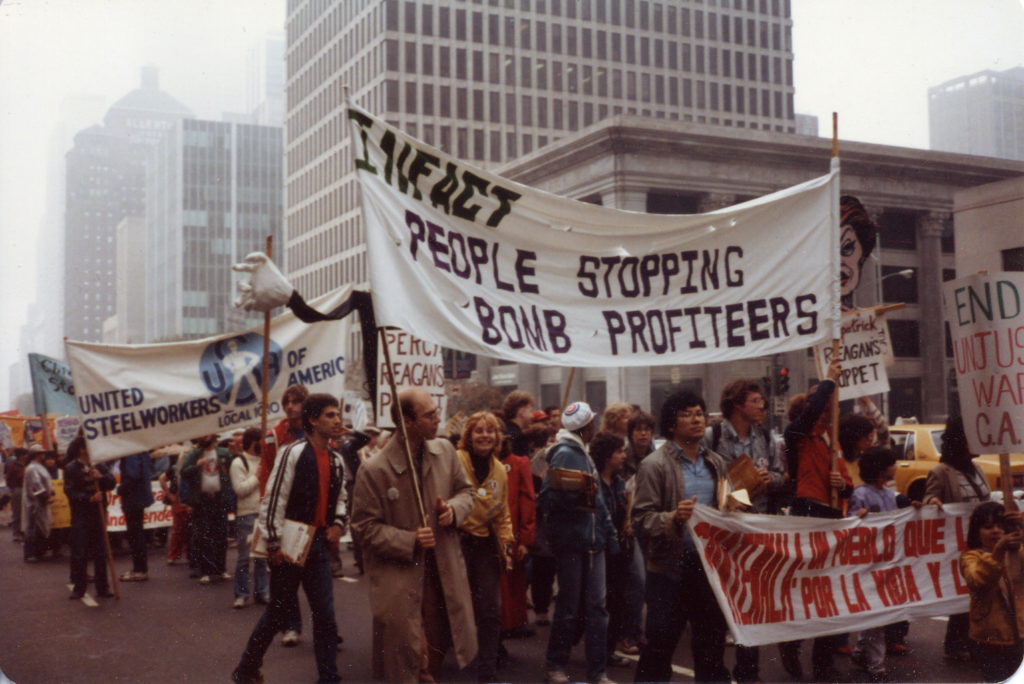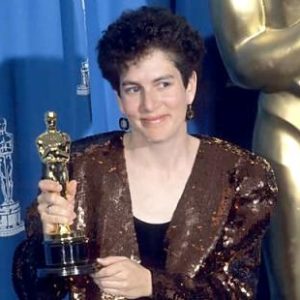It was after 10:30 p.m. on a Monday, and campaign headquarters was buzzing. The fax machine looked as if it might break down as dozens of congratulatory messages poured in from around the world. Staff were fielding calls from The New York Times, NPR, and the Wall Street Journal – giddy from adrenaline and joy.
It seemed impossible, like a little tear in the fabric of reality. But we had done it: Deadly Deception: General Electric, Nuclear Weapons and Our Environment had won the Oscar.
It was 1992, and General Electric was one of the most powerful corporations in the world. And in an instant a billion TV viewers had heard the truth: G.E., a leading proponent of nuclear weapons and the manufacturer of more components to more nuclear weapons systems than any other corporation, was dangerous, dishonest, and deadly. The bright lights of Hollywood were suddenly shining on G.E.’s dirtiest secrets.
And none of it would have happened without the extraordinary courage of a filmmaker named Debra Chasnoff.
Debra Chasnoff, or Chas, as we all called her, passed away late last year.
A filmmaker grounded in a movement
“Chas was a very courageous woman,” remembers Elaine Lamy, former executive director of Infact, now known as Corporate Accountability. Lamy was director of campaign development and research during the production of the film, and she worked closely with Chas to create Deadly Deception. Tall, young, lesbian, and out, Chas was self-confident with a great sense of humor. “She often had a big smile on her face,” Lamy recalled.
Prior to working on Deadly Deception, Chas got connected with Corporate Accountability through the Nestlé boycott. “I was outraged by the way women were treated and about the way corporations operated with blatant disregard for human life,” Chas said in 1992. She found a home in Corporate Accountability’s organizing. “It was really exciting to find an organization that insisted people don’t have to be powerless … It taught me that if people work together you really can make a difference.”
Chas’s first film, Choosing Children, documented the experiences of lesbians deciding to become parents and raising their families. Chas’s organizing skills, her commitment to women’s leadership, and her willingness to face controversy in order to tell the truth were self-evident. So when Corporate Accountability had the audacious idea of exposing G.E. on the silver screen, Chas was a natural fit.
Taking on G.E.

Big public actions like this one helped expose G.E. and move the transnational corporation out of the nuclear weapons business.
Corporate Accountability launched its campaign focusing on the “Generals” (General Electric, General Dynamics, and General Motors) in 1984, at the height of Ronald Reagan’s Cold War. In 1986, our research identified G.E. as the nuclear weapons industry leader.
“Deadly Deception was a part of a larger strategy to alter the image that GE worked so hard to instill in consumers, its work force, the public at large, and even policymakers,” Lamy said. “The company was spending a great deal of money to convince these audiences that: ‘We Bring Good Things to Life.’”
The galling contrast between G.E.’s slogan and its actions spoke to Chas as a storyteller and as an organizer.
“I was very intrigued with the idea of General Electric,” Chas said in an interview. She saw the opportunity to “use actual bits of their own commercials in the film and turn it back against them.”
Telling the stories of survivors — and those who lost their lives
Throughout Deadly Deception, Chas excerpted those commercials, juxtaposing them with the wrenching stories at the heart of the film: the stories of G.E. employees and people who lived near G.E.’s plants who suffered cancer and death because of the corporation’s lies. Part of what made the film compelling was the heartfelt testimony that people shared with Chas. June Casey, for example, told the harrowing story of how she was poisoned as a college student living close to the Hanford nuclear reservation where G.E. ran secret experiments.
“I agreed to it because it was a way to get the story out,” Casey said of being featured in the film. Remembering Chas, she said, “It was wonderful to have a person of her caliber be the director.”
Speaking truth to power
Not only did Chas need to communicate G.E.’s human toll; she had to do it in a way that advanced the objectives of a long-running corporate campaign. Balancing the competing claims of good storytelling and strategic campaigning was challenging. Creating the film took perseverance and problem solving both from Chas and Corporate Accountability staff.
“It was one of the prouder moments of my life,” said Nancy Cole, who was executive director for much of the period when Deadly Deception was being made. “The people who trusted us with their stories, who trusted this little organization that was fighting this huge company, where the stakes were so high — it seemed like they were vindicated.”
Taking the mic
But perhaps the most remarkable moment came after directors John Singleton and Spike Lee handed Chas the Oscar. In her acceptance speech, Chas honored Infact and people all over the world challenging G.E. She thanked her partner and their son for their support — coming out as lesbian and making her the first female recipient to thank their partner from the Oscars stage. And then, thrusting her 8.5 pound Oscar into the air, she implored the billion people watching: “Boycott G.E.!” In the 45 seconds before they cued the orchestral music, Chas made history — twice.
It was a level of public exposure that G.E. could not tolerate. Thanks to the film, Chas’s speech, and worldwide organizing by millions of people, G.E. got out of the nuclear weapons business within a year.
Moving forward
When Chas died last November, she was in the midst of another courageous project: making a film about living with a life-changing cancer diagnosis. It’s typical of Chas that she wanted to use the story of her own struggle with cancer to help liberate other people.
The fearless filmmaking behind Deadly Deception. Chas’s personal courage in coming out at the Academy Awards. Her demand for one billion people to boycott G.E. All of these Chas memories have left an indelible impression on how I organize, and how I move through the world.
Chas reminded all of us that a good corporate campaign tactic will not only move transnational corporations — it will move people in ways they may not even be able to name or identify.
She taught me that good storytelling is a critical tool for prevailing against the mightiest opponents.
And she taught me that there’s nothing more powerful than using your voice and your talent to challenge injustice.
Here’s to you, Chas. And here’s to the millions of people you inspired, who continue organizing for a just future free of corporate abuse every day.




